University Managerial Accounting Case Study: Analysis and Solution
VerifiedAdded on 2020/04/21
|10
|1237
|93
Case Study
AI Summary
This managerial accounting case study presents two scenarios requiring financial analysis and decision-making. Case Study A examines special order decisions, evaluating incremental revenue, costs, and net operating income under different conditions. It analyzes the impact of accepting or rejecting special orders on profitability, considering both quantitative and qualitative factors like investor impact, employee morale, environmental concerns, ethical considerations, and community welfare. Case Study B focuses on whether to close a store, analyzing the gross margin lost, avoidable costs, and the resulting impact on net operating income. The analysis includes evaluating the potential for increasing operating income by reducing costs and targeting high-margin products. The study considers the effect of closing a store on overall profitability and explores the impact of shifting customers to another store, providing a comprehensive assessment of the financial implications of each decision.
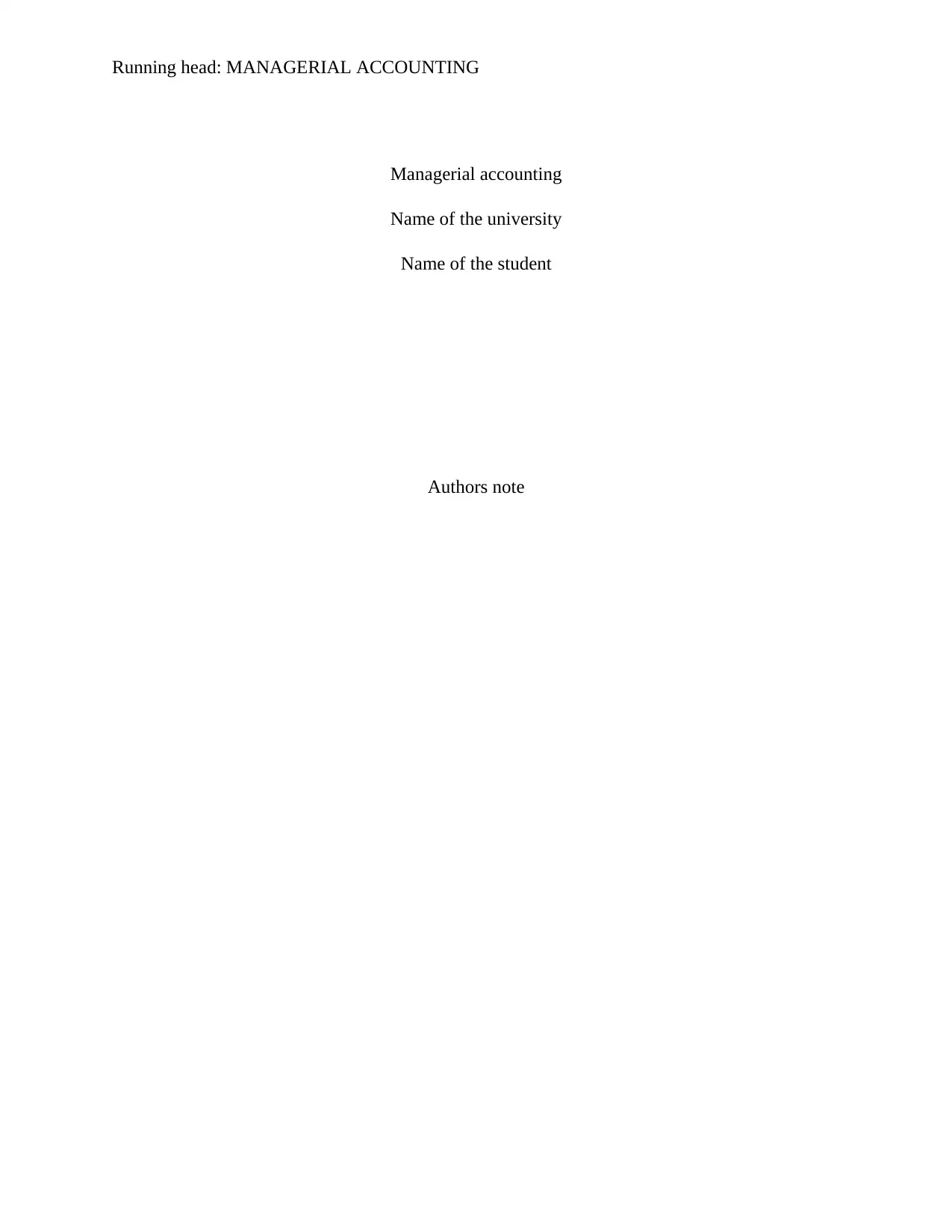
Running head: MANAGERIAL ACCOUNTING
Managerial accounting
Name of the university
Name of the student
Authors note
Managerial accounting
Name of the university
Name of the student
Authors note
Paraphrase This Document
Need a fresh take? Get an instant paraphrase of this document with our AI Paraphraser
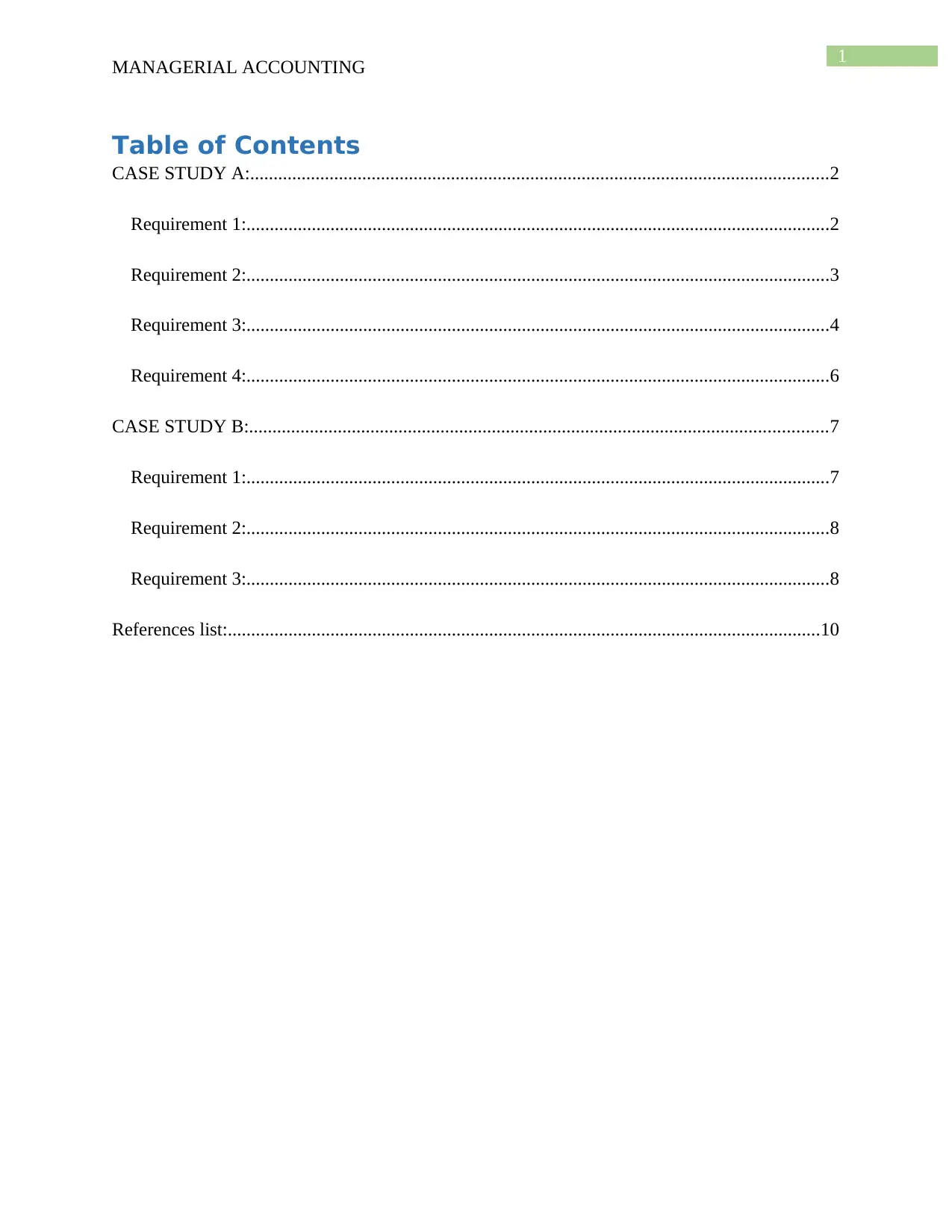
1
MANAGERIAL ACCOUNTING
Table of Contents
CASE STUDY A:............................................................................................................................2
Requirement 1:.............................................................................................................................2
Requirement 2:.............................................................................................................................3
Requirement 3:.............................................................................................................................4
Requirement 4:.............................................................................................................................6
CASE STUDY B:............................................................................................................................7
Requirement 1:.............................................................................................................................7
Requirement 2:.............................................................................................................................8
Requirement 3:.............................................................................................................................8
References list:...............................................................................................................................10
MANAGERIAL ACCOUNTING
Table of Contents
CASE STUDY A:............................................................................................................................2
Requirement 1:.............................................................................................................................2
Requirement 2:.............................................................................................................................3
Requirement 3:.............................................................................................................................4
Requirement 4:.............................................................................................................................6
CASE STUDY B:............................................................................................................................7
Requirement 1:.............................................................................................................................7
Requirement 2:.............................................................................................................................8
Requirement 3:.............................................................................................................................8
References list:...............................................................................................................................10
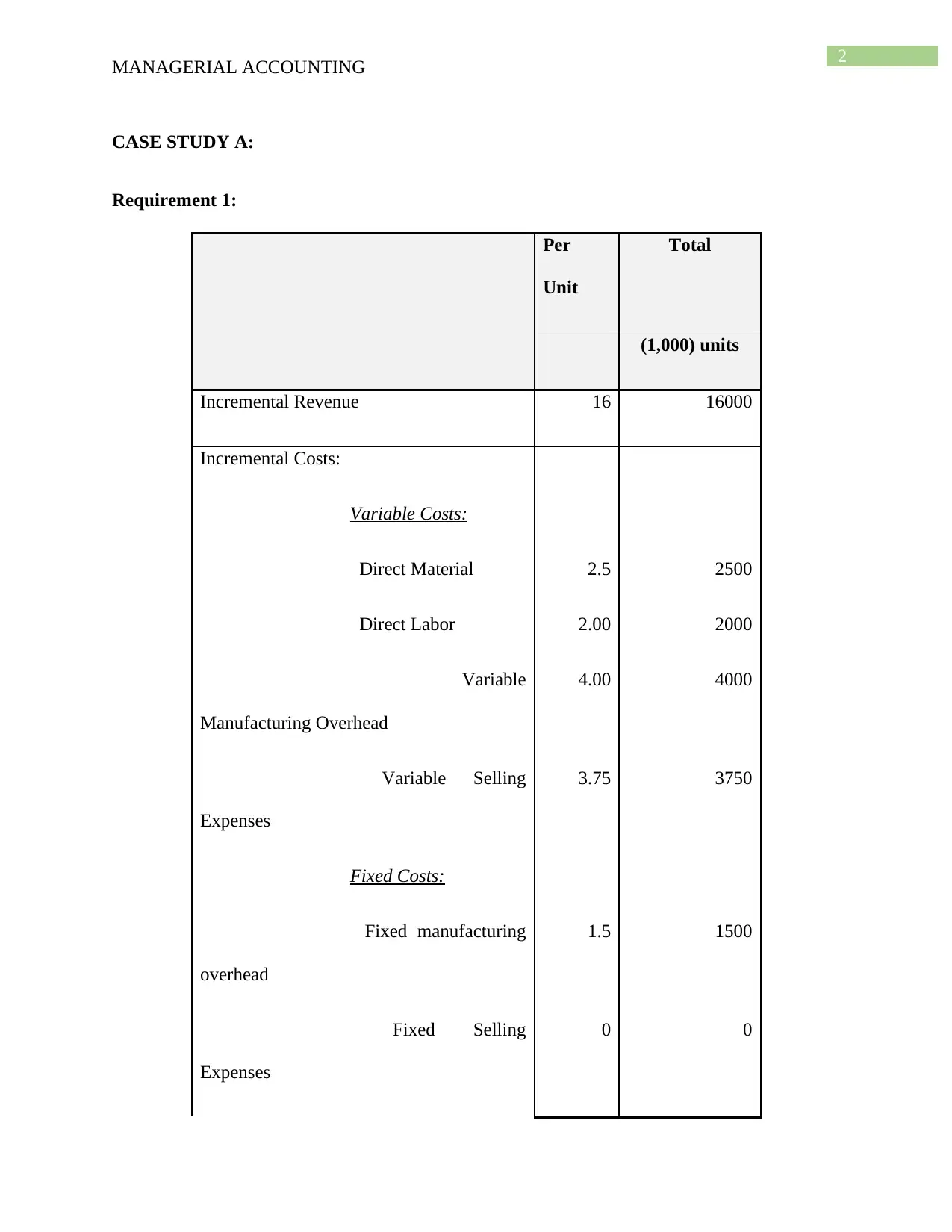
2
MANAGERIAL ACCOUNTING
CASE STUDY A:
Requirement 1:
Per
Unit
Total
(1,000) units
Incremental Revenue 16 16000
Incremental Costs:
Variable Costs:
Direct Material 2.5 2500
Direct Labor 2.00 2000
Variable
Manufacturing Overhead
4.00 4000
Variable Selling
Expenses
3.75 3750
Fixed Costs:
Fixed manufacturing
overhead
1.5 1500
Fixed Selling
Expenses
0 0
MANAGERIAL ACCOUNTING
CASE STUDY A:
Requirement 1:
Per
Unit
Total
(1,000) units
Incremental Revenue 16 16000
Incremental Costs:
Variable Costs:
Direct Material 2.5 2500
Direct Labor 2.00 2000
Variable
Manufacturing Overhead
4.00 4000
Variable Selling
Expenses
3.75 3750
Fixed Costs:
Fixed manufacturing
overhead
1.5 1500
Fixed Selling
Expenses
0 0
⊘ This is a preview!⊘
Do you want full access?
Subscribe today to unlock all pages.

Trusted by 1+ million students worldwide
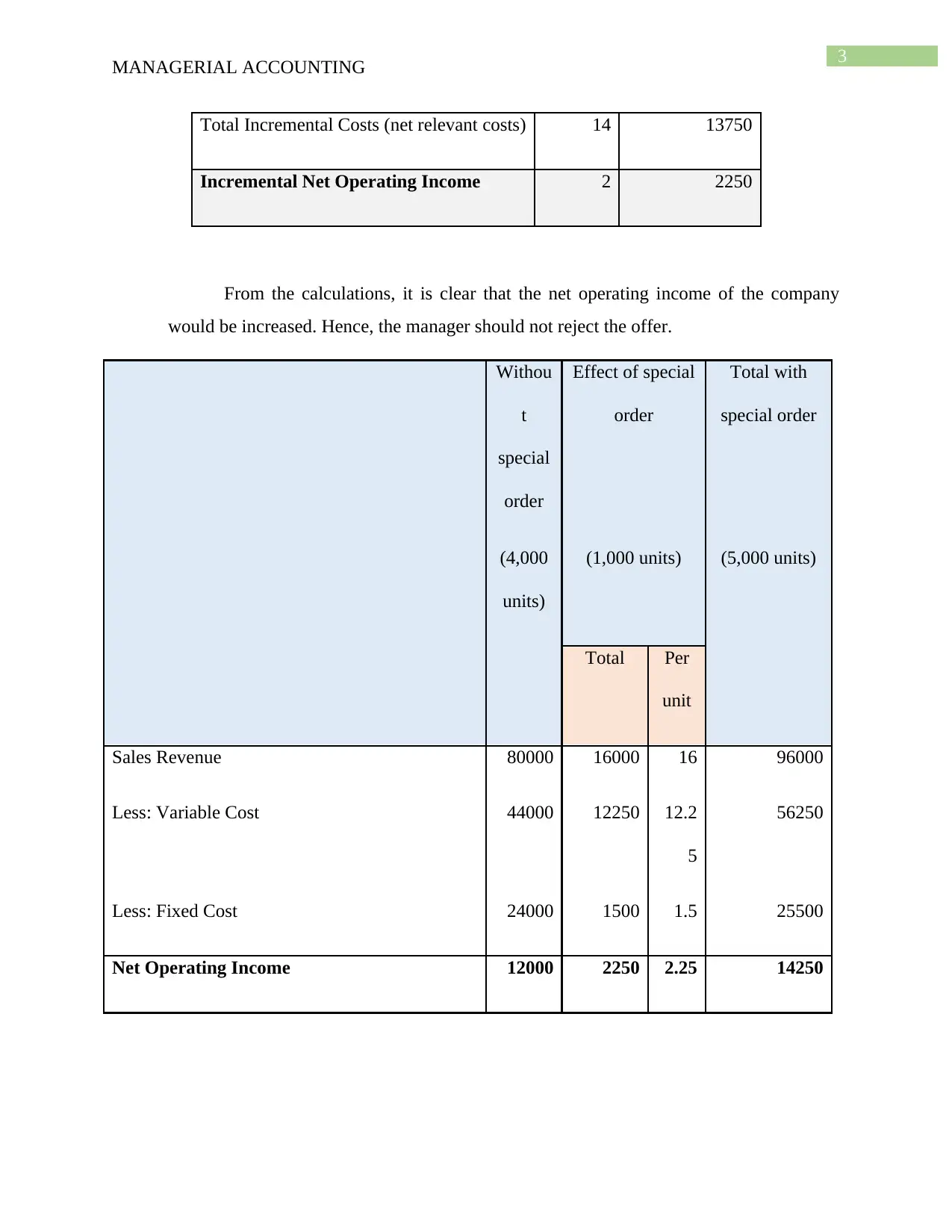
3
MANAGERIAL ACCOUNTING
Total Incremental Costs (net relevant costs) 14 13750
Incremental Net Operating Income 2 2250
From the calculations, it is clear that the net operating income of the company
would be increased. Hence, the manager should not reject the offer.
Withou
t
special
order
Effect of special
order
Total with
special order
(4,000
units)
(1,000 units) (5,000 units)
Total Per
unit
Sales Revenue 80000 16000 16 96000
Less: Variable Cost 44000 12250 12.2
5
56250
Less: Fixed Cost 24000 1500 1.5 25500
Net Operating Income 12000 2250 2.25 14250
MANAGERIAL ACCOUNTING
Total Incremental Costs (net relevant costs) 14 13750
Incremental Net Operating Income 2 2250
From the calculations, it is clear that the net operating income of the company
would be increased. Hence, the manager should not reject the offer.
Withou
t
special
order
Effect of special
order
Total with
special order
(4,000
units)
(1,000 units) (5,000 units)
Total Per
unit
Sales Revenue 80000 16000 16 96000
Less: Variable Cost 44000 12250 12.2
5
56250
Less: Fixed Cost 24000 1500 1.5 25500
Net Operating Income 12000 2250 2.25 14250
Paraphrase This Document
Need a fresh take? Get an instant paraphrase of this document with our AI Paraphraser
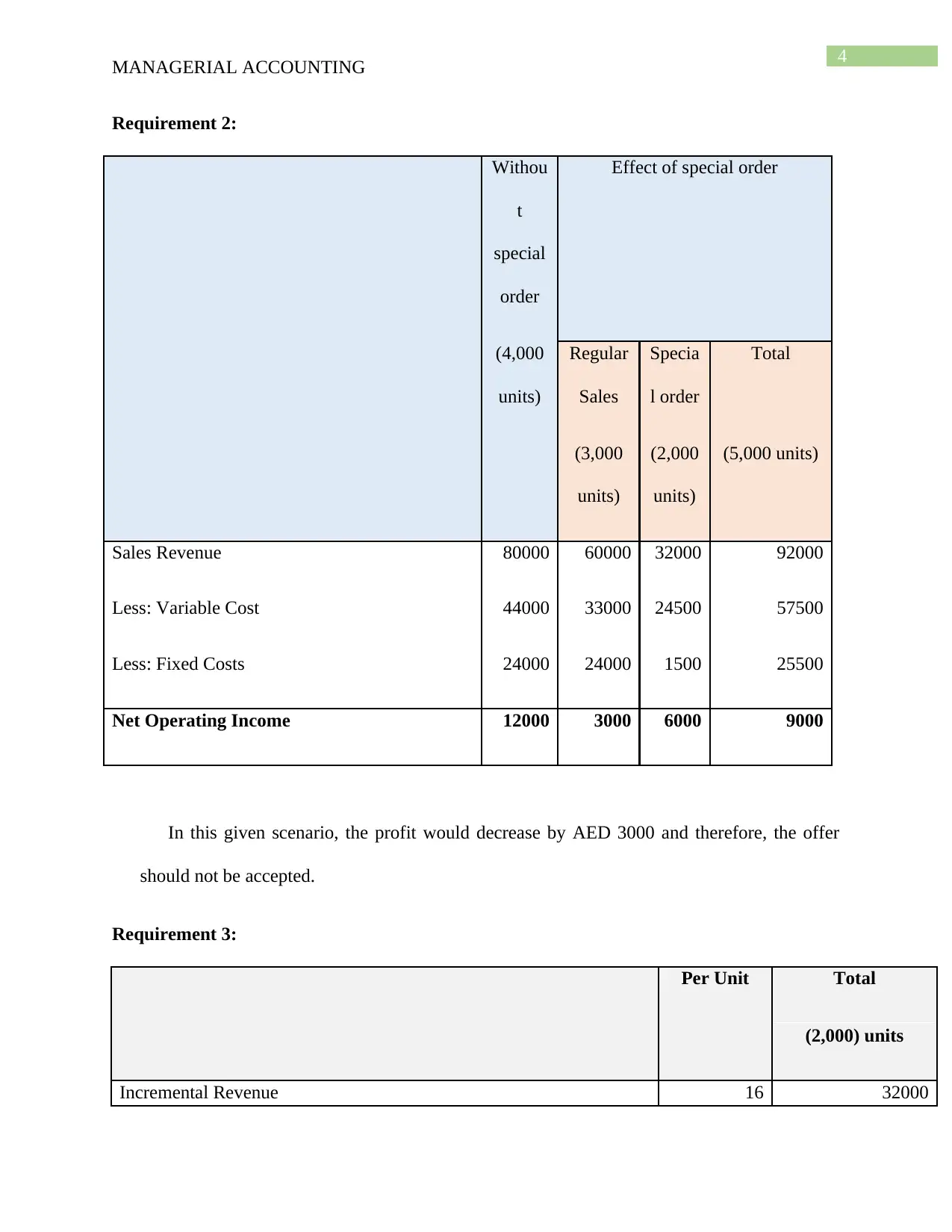
4
MANAGERIAL ACCOUNTING
Requirement 2:
Withou
t
special
order
Effect of special order
(4,000
units)
Regular
Sales
Specia
l order
Total
(3,000
units)
(2,000
units)
(5,000 units)
Sales Revenue 80000 60000 32000 92000
Less: Variable Cost 44000 33000 24500 57500
Less: Fixed Costs 24000 24000 1500 25500
Net Operating Income 12000 3000 6000 9000
In this given scenario, the profit would decrease by AED 3000 and therefore, the offer
should not be accepted.
Requirement 3:
Per Unit Total
(2,000) units
Incremental Revenue 16 32000
MANAGERIAL ACCOUNTING
Requirement 2:
Withou
t
special
order
Effect of special order
(4,000
units)
Regular
Sales
Specia
l order
Total
(3,000
units)
(2,000
units)
(5,000 units)
Sales Revenue 80000 60000 32000 92000
Less: Variable Cost 44000 33000 24500 57500
Less: Fixed Costs 24000 24000 1500 25500
Net Operating Income 12000 3000 6000 9000
In this given scenario, the profit would decrease by AED 3000 and therefore, the offer
should not be accepted.
Requirement 3:
Per Unit Total
(2,000) units
Incremental Revenue 16 32000
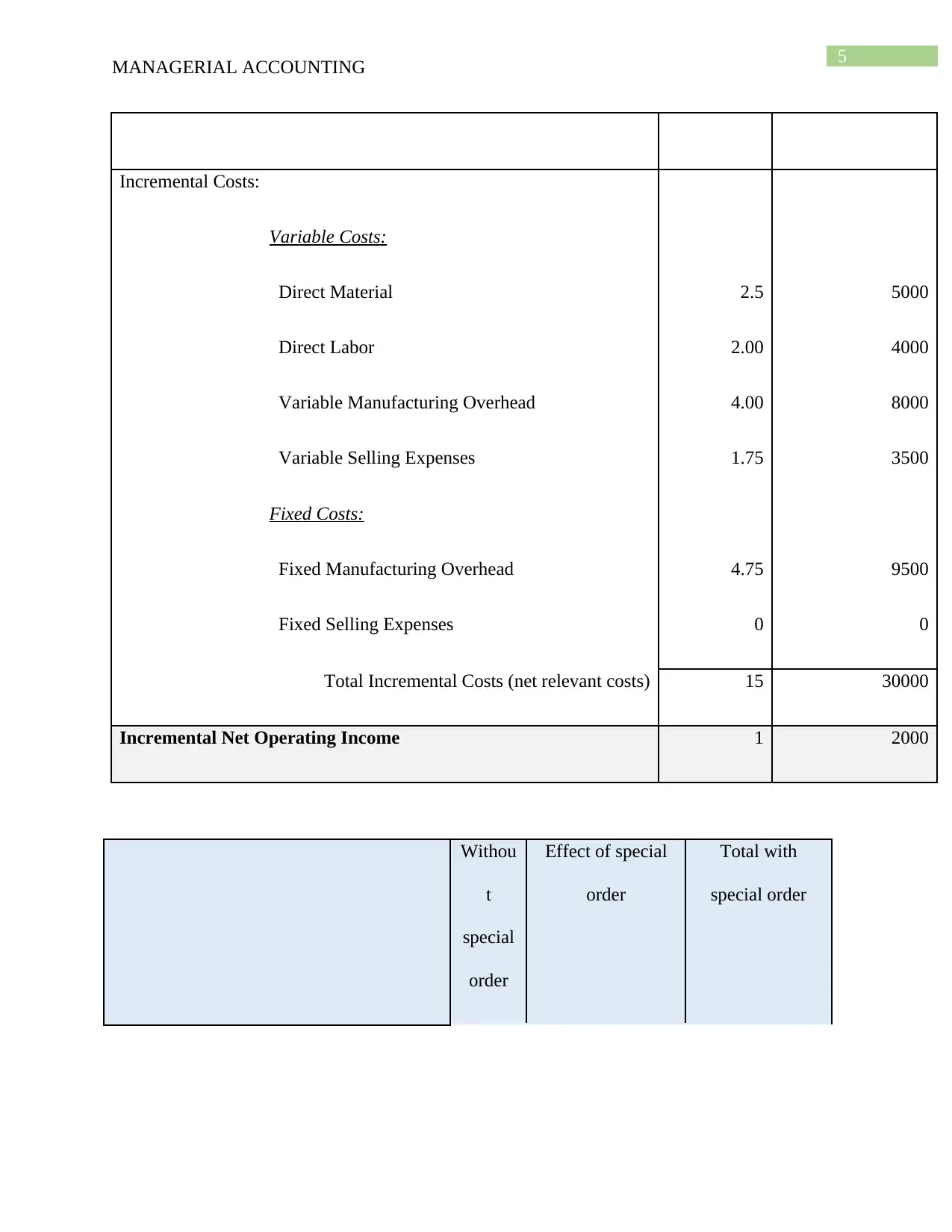
5
MANAGERIAL ACCOUNTING
Incremental Costs:
Variable Costs:
Direct Material 2.5 5000
Direct Labor 2.00 4000
Variable Manufacturing Overhead 4.00 8000
Variable Selling Expenses 1.75 3500
Fixed Costs:
Fixed Manufacturing Overhead 4.75 9500
Fixed Selling Expenses 0 0
Total Incremental Costs (net relevant costs) 15 30000
Incremental Net Operating Income 1 2000
Withou
t
special
order
Effect of special
order
Total with
special order
MANAGERIAL ACCOUNTING
Incremental Costs:
Variable Costs:
Direct Material 2.5 5000
Direct Labor 2.00 4000
Variable Manufacturing Overhead 4.00 8000
Variable Selling Expenses 1.75 3500
Fixed Costs:
Fixed Manufacturing Overhead 4.75 9500
Fixed Selling Expenses 0 0
Total Incremental Costs (net relevant costs) 15 30000
Incremental Net Operating Income 1 2000
Withou
t
special
order
Effect of special
order
Total with
special order
⊘ This is a preview!⊘
Do you want full access?
Subscribe today to unlock all pages.

Trusted by 1+ million students worldwide
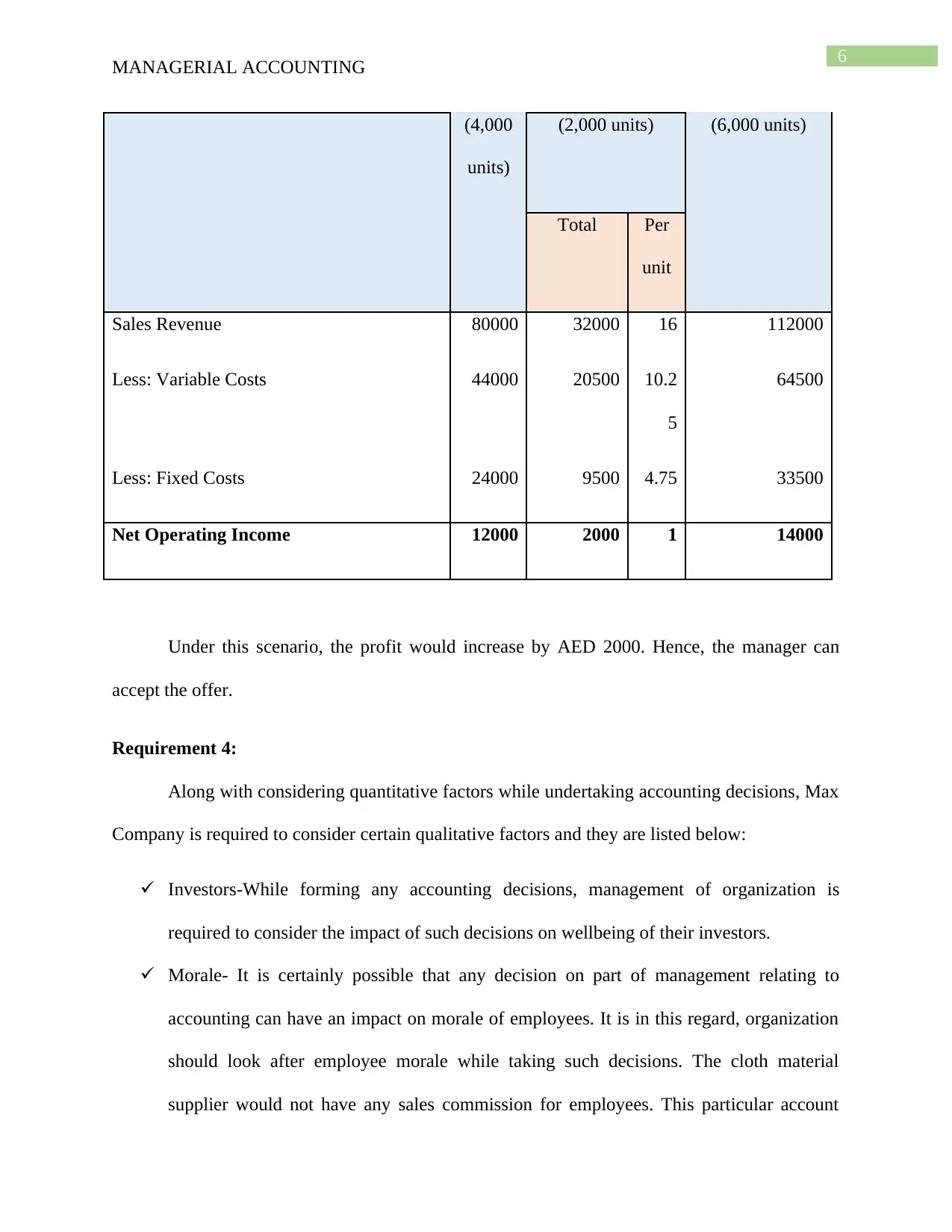
6
MANAGERIAL ACCOUNTING
(4,000
units)
(2,000 units) (6,000 units)
Total Per
unit
Sales Revenue 80000 32000 16 112000
Less: Variable Costs 44000 20500 10.2
5
64500
Less: Fixed Costs 24000 9500 4.75 33500
Net Operating Income 12000 2000 1 14000
Under this scenario, the profit would increase by AED 2000. Hence, the manager can
accept the offer.
Requirement 4:
Along with considering quantitative factors while undertaking accounting decisions, Max
Company is required to consider certain qualitative factors and they are listed below:
Investors-While forming any accounting decisions, management of organization is
required to consider the impact of such decisions on wellbeing of their investors.
Morale- It is certainly possible that any decision on part of management relating to
accounting can have an impact on morale of employees. It is in this regard, organization
should look after employee morale while taking such decisions. The cloth material
supplier would not have any sales commission for employees. This particular account
MANAGERIAL ACCOUNTING
(4,000
units)
(2,000 units) (6,000 units)
Total Per
unit
Sales Revenue 80000 32000 16 112000
Less: Variable Costs 44000 20500 10.2
5
64500
Less: Fixed Costs 24000 9500 4.75 33500
Net Operating Income 12000 2000 1 14000
Under this scenario, the profit would increase by AED 2000. Hence, the manager can
accept the offer.
Requirement 4:
Along with considering quantitative factors while undertaking accounting decisions, Max
Company is required to consider certain qualitative factors and they are listed below:
Investors-While forming any accounting decisions, management of organization is
required to consider the impact of such decisions on wellbeing of their investors.
Morale- It is certainly possible that any decision on part of management relating to
accounting can have an impact on morale of employees. It is in this regard, organization
should look after employee morale while taking such decisions. The cloth material
supplier would not have any sales commission for employees. This particular account
Paraphrase This Document
Need a fresh take? Get an instant paraphrase of this document with our AI Paraphraser
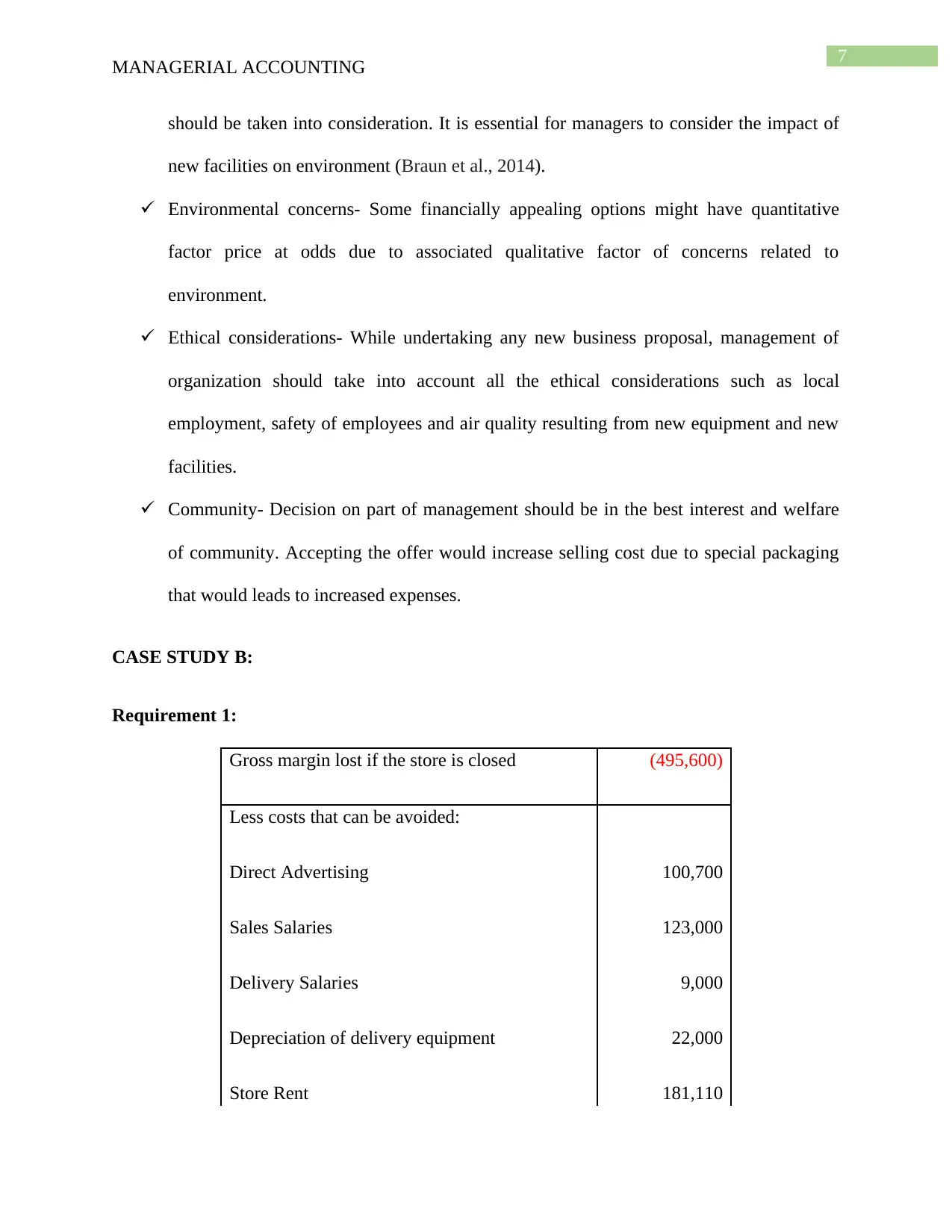
7
MANAGERIAL ACCOUNTING
should be taken into consideration. It is essential for managers to consider the impact of
new facilities on environment (Braun et al., 2014).
Environmental concerns- Some financially appealing options might have quantitative
factor price at odds due to associated qualitative factor of concerns related to
environment.
Ethical considerations- While undertaking any new business proposal, management of
organization should take into account all the ethical considerations such as local
employment, safety of employees and air quality resulting from new equipment and new
facilities.
Community- Decision on part of management should be in the best interest and welfare
of community. Accepting the offer would increase selling cost due to special packaging
that would leads to increased expenses.
CASE STUDY B:
Requirement 1:
Gross margin lost if the store is closed (495,600)
Less costs that can be avoided:
Direct Advertising 100,700
Sales Salaries 123,000
Delivery Salaries 9,000
Depreciation of delivery equipment 22,000
Store Rent 181,110
MANAGERIAL ACCOUNTING
should be taken into consideration. It is essential for managers to consider the impact of
new facilities on environment (Braun et al., 2014).
Environmental concerns- Some financially appealing options might have quantitative
factor price at odds due to associated qualitative factor of concerns related to
environment.
Ethical considerations- While undertaking any new business proposal, management of
organization should take into account all the ethical considerations such as local
employment, safety of employees and air quality resulting from new equipment and new
facilities.
Community- Decision on part of management should be in the best interest and welfare
of community. Accepting the offer would increase selling cost due to special packaging
that would leads to increased expenses.
CASE STUDY B:
Requirement 1:
Gross margin lost if the store is closed (495,600)
Less costs that can be avoided:
Direct Advertising 100,700
Sales Salaries 123,000
Delivery Salaries 9,000
Depreciation of delivery equipment 22,000
Store Rent 181,110
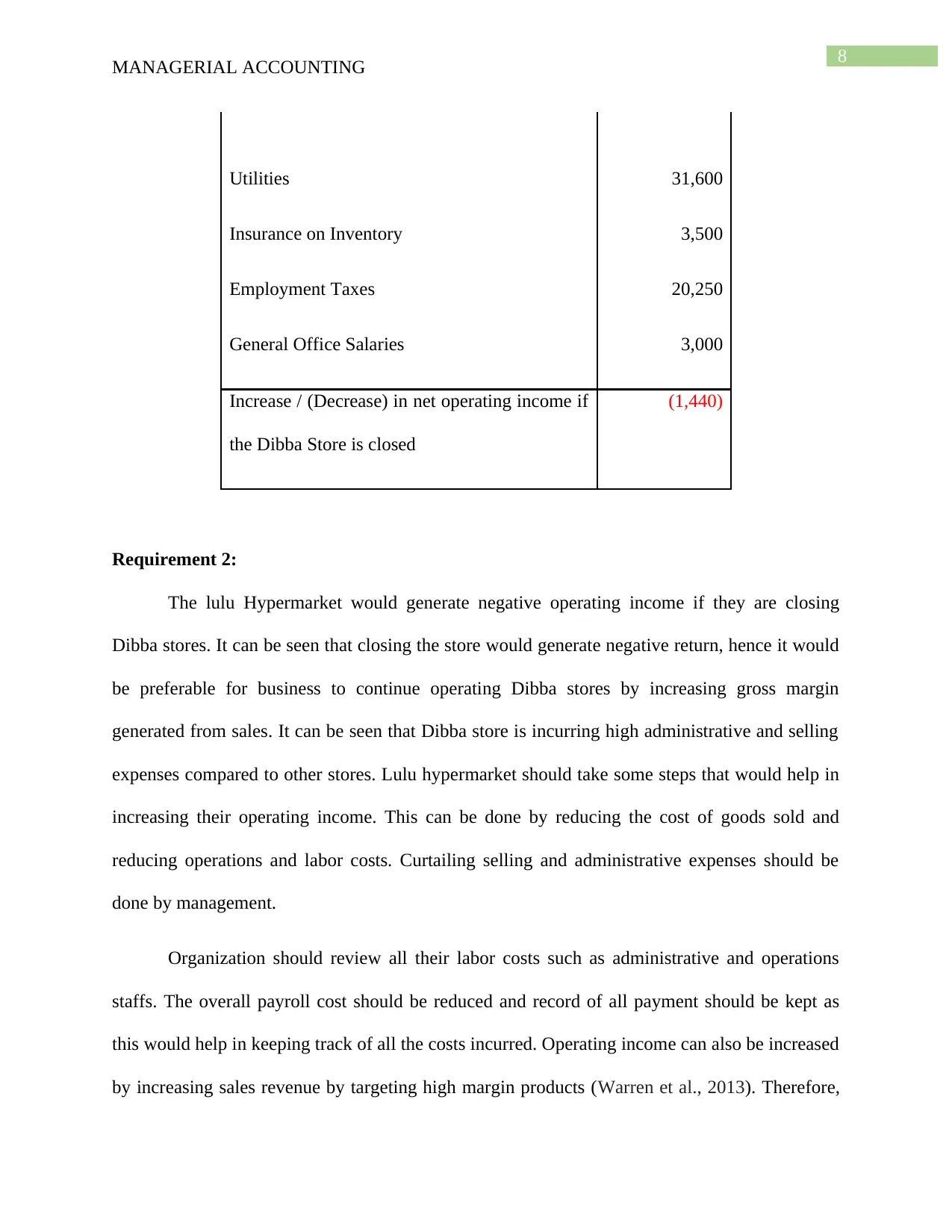
8
MANAGERIAL ACCOUNTING
Utilities 31,600
Insurance on Inventory 3,500
Employment Taxes 20,250
General Office Salaries 3,000
Increase / (Decrease) in net operating income if
the Dibba Store is closed
(1,440)
Requirement 2:
The lulu Hypermarket would generate negative operating income if they are closing
Dibba stores. It can be seen that closing the store would generate negative return, hence it would
be preferable for business to continue operating Dibba stores by increasing gross margin
generated from sales. It can be seen that Dibba store is incurring high administrative and selling
expenses compared to other stores. Lulu hypermarket should take some steps that would help in
increasing their operating income. This can be done by reducing the cost of goods sold and
reducing operations and labor costs. Curtailing selling and administrative expenses should be
done by management.
Organization should review all their labor costs such as administrative and operations
staffs. The overall payroll cost should be reduced and record of all payment should be kept as
this would help in keeping track of all the costs incurred. Operating income can also be increased
by increasing sales revenue by targeting high margin products (Warren et al., 2013). Therefore,
MANAGERIAL ACCOUNTING
Utilities 31,600
Insurance on Inventory 3,500
Employment Taxes 20,250
General Office Salaries 3,000
Increase / (Decrease) in net operating income if
the Dibba Store is closed
(1,440)
Requirement 2:
The lulu Hypermarket would generate negative operating income if they are closing
Dibba stores. It can be seen that closing the store would generate negative return, hence it would
be preferable for business to continue operating Dibba stores by increasing gross margin
generated from sales. It can be seen that Dibba store is incurring high administrative and selling
expenses compared to other stores. Lulu hypermarket should take some steps that would help in
increasing their operating income. This can be done by reducing the cost of goods sold and
reducing operations and labor costs. Curtailing selling and administrative expenses should be
done by management.
Organization should review all their labor costs such as administrative and operations
staffs. The overall payroll cost should be reduced and record of all payment should be kept as
this would help in keeping track of all the costs incurred. Operating income can also be increased
by increasing sales revenue by targeting high margin products (Warren et al., 2013). Therefore,
⊘ This is a preview!⊘
Do you want full access?
Subscribe today to unlock all pages.

Trusted by 1+ million students worldwide
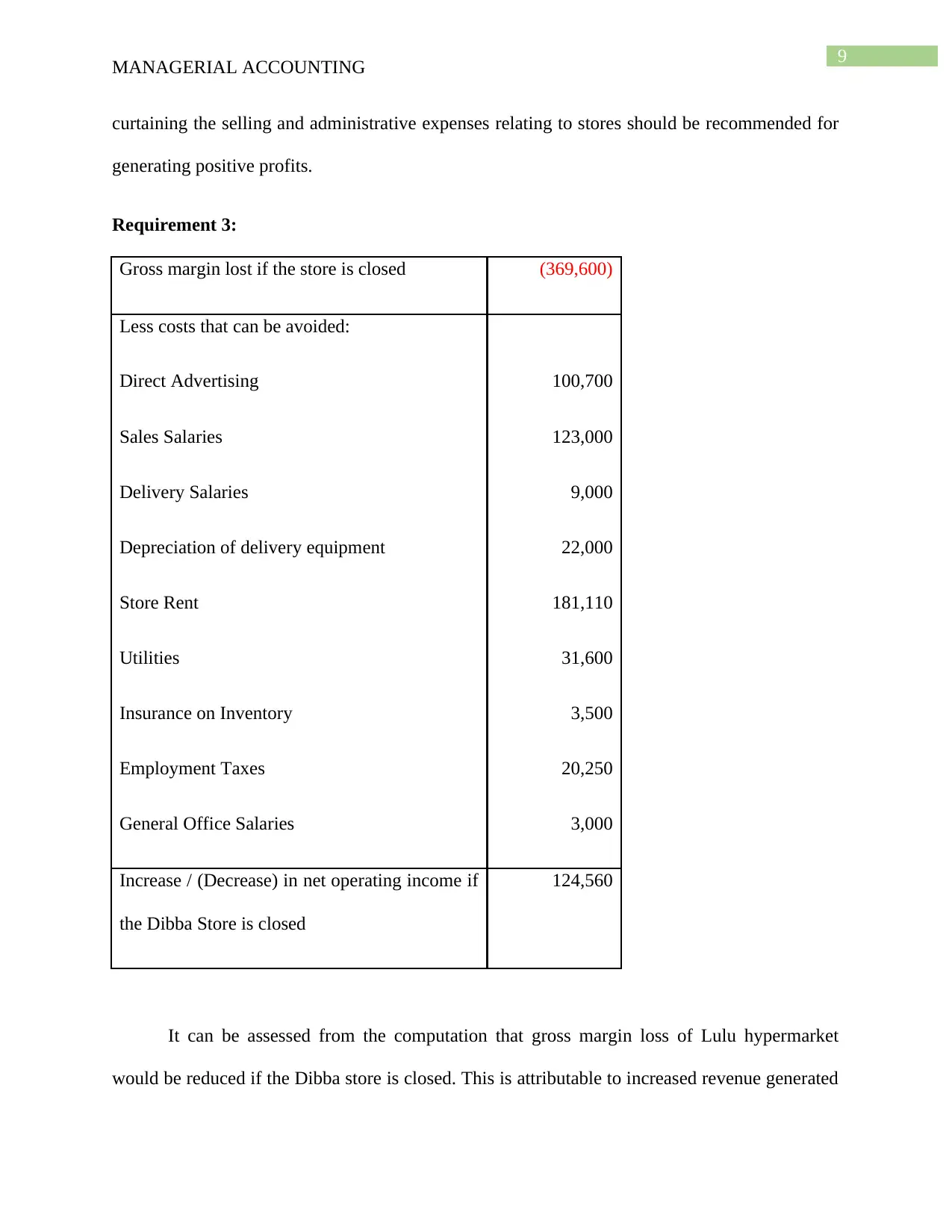
9
MANAGERIAL ACCOUNTING
curtaining the selling and administrative expenses relating to stores should be recommended for
generating positive profits.
Requirement 3:
Gross margin lost if the store is closed (369,600)
Less costs that can be avoided:
Direct Advertising 100,700
Sales Salaries 123,000
Delivery Salaries 9,000
Depreciation of delivery equipment 22,000
Store Rent 181,110
Utilities 31,600
Insurance on Inventory 3,500
Employment Taxes 20,250
General Office Salaries 3,000
Increase / (Decrease) in net operating income if
the Dibba Store is closed
124,560
It can be assessed from the computation that gross margin loss of Lulu hypermarket
would be reduced if the Dibba store is closed. This is attributable to increased revenue generated
MANAGERIAL ACCOUNTING
curtaining the selling and administrative expenses relating to stores should be recommended for
generating positive profits.
Requirement 3:
Gross margin lost if the store is closed (369,600)
Less costs that can be avoided:
Direct Advertising 100,700
Sales Salaries 123,000
Delivery Salaries 9,000
Depreciation of delivery equipment 22,000
Store Rent 181,110
Utilities 31,600
Insurance on Inventory 3,500
Employment Taxes 20,250
General Office Salaries 3,000
Increase / (Decrease) in net operating income if
the Dibba Store is closed
124,560
It can be assessed from the computation that gross margin loss of Lulu hypermarket
would be reduced if the Dibba store is closed. This is attributable to increased revenue generated
1 out of 10
Related Documents
Your All-in-One AI-Powered Toolkit for Academic Success.
+13062052269
info@desklib.com
Available 24*7 on WhatsApp / Email
![[object Object]](/_next/static/media/star-bottom.7253800d.svg)
Unlock your academic potential
Copyright © 2020–2026 A2Z Services. All Rights Reserved. Developed and managed by ZUCOL.





